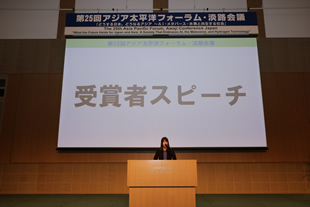 The 23rd Asia Pacific Research Prize - Commendation winner: Dr. Natsuko Miyokawa
The 23rd Asia Pacific Research Prize - Commendation winner: Dr. Natsuko Miyokawa
Title of Dissertation: “The‘Two Chinas’and Liberal Democratic Party Politics: Informal Channels in Postwar Japan-Taiwan Relations”

- Dr. Natsuko Miyokawa
-
- Career -
Natsuko Miyokawa specializes in the political and diplomatic history of Japan and Asia. Doctor of Laws. She is currently a project lecturer at the Institute of Business Law and Comparative Law & Politics, Graduate Schools for Law and Politics, The University of Tokyo. She graduated from the School of Law, Hokkaido University in 2015. She completed her master’s degree at the Graduate School of Law, Hokkaido University in 2018, and her doctoral degree at the Graduate Schools for Law and Politics, The University of Tokyo in 2024. She was a JSPS Research Fellow DC1 (2018-2021) and a MOFA Taiwan Fellow (2021-2022) before assuming her current position in April 2024.
- Summary -
By focusing on the channels between Japan and Taiwan (Republic of China) in the postwar period and tracing the process of their evolution, the paper clarifies the process of foreign policy making in Liberal Democratic Party (LDP) politics during the Cold War from the perspective of political and diplomatic history. How were the channels of negotiation between Japan and Taiwan formed during the Cold War, when the two sides experienced the establishment and breakdown of diplomatic relations? What were the respective roles of the Japanese government, the LDP, and its factions in contacting the “Two Chinas”? Based on this awareness, the paper reveals the formation process of the Japan-Taiwan channels by examining the intentions and movements of various actors on both sides, especially the contacts between LDP politicians and their Taiwanese counterparts. At the same time, it details the process of discrepancies in perceptions among the various actors, taking into account the interactions among bureaucrats and politicians as well as between ministries.Given that Asian history has long been discussed based on Anglo-American sources and that recently there has been demand for a history of the Cold War from a unique Asian perspective, the paper draws primarily on recently published sources in Japan and Taiwan, personal documents obtained independently, and interviews with relevant individuals, in addition to diplomatic sources from several governments.
What has become clear through the paper is, first, the fact that “informal channels” have been utilized regardless of the presence or absence of diplomatic relations. The negotiation process between Japan and Taiwan suggests that the need for “official channels” (semi-official channels) does not diminish even when diplomatic relations between the governments are severed, and conversely, “informal channels” can be emphasized even when diplomatic relations are maintained. What was critical for communication between the two governments was a common perception of their counterparts that would ensure a connection to policy makers, i.e., stable channels, both formal and informal.
Second, the LDP, which was in power for a long time, was able to deal with two opposing governments, China (People’s Republic of China) and Taiwan, at the same time, because its lawmakers were free to engage in foreign activities, backed by factional politics. In contrast to the Ministry of Foreign Affairs, which focused on relations with China after the normalization of diplomatic relations, the LDP, which became a catch-all party also on the diplomatic front, established a system allowing it to balance between the “Two Chinas.”






